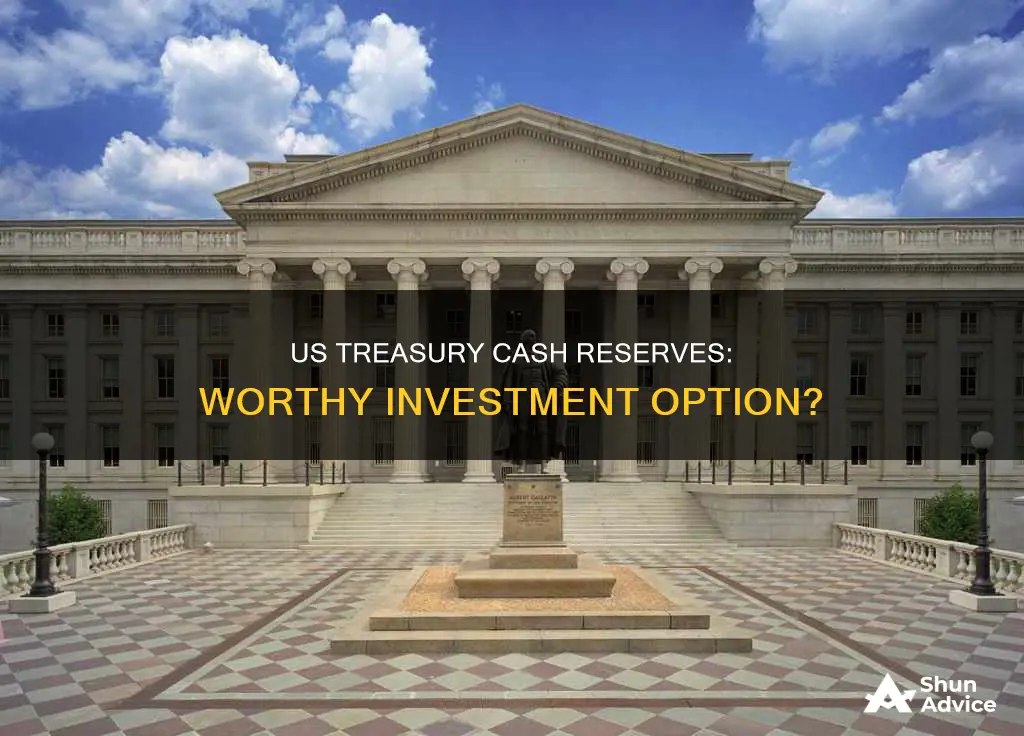
US Treasury Cash Reserves are a strategic part of financial planning for individuals and businesses. They are highly liquid, short-term investments that enable quick access to funds in exchange for lower returns. Treasury bills, money market funds, and liquid assets like stocks and bonds are common components of cash reserves. While cash reserves are essential for emergency funding and large purchases, individuals and businesses must balance their reserves with other investment opportunities to avoid missing out on higher returns.
| Characteristics | Values |
|---|---|
| Definition | Money a company or individual keeps on hand to meet short-term and emergency funding needs |
| Examples | Money market funds, Treasury Bills (T-Bills) |
| Purpose | To make a large purchase immediately or cover sudden, unexpected payments |
| Recommended Amount for Businesses | 3-6 months of operating expenses |
| Recommended Amount for Individuals | Enough to last at least 3-6 months in case of an emergency |
| Where to Keep Cash Reserves | Bank accounts, short-term stable investments, savings accounts, money market funds, money market accounts, T-Bills, certificates of deposit (CDs) |
| Advantages | Ensures liquidity, quick access to cash, ability to respond to urgent needs or opportunities |
| Disadvantages | Hoarding excess cash can lead to missed opportunities and lower returns compared to other investments |
What You'll Learn

What are US Treasury Cash Reserves?
US Treasury Cash Reserves are a type of money market fund. Money market funds are short-term, highly liquid investments that enable customers to quickly gain access to their money, often in exchange for a lower rate of return.
US Treasury Cash Reserves seek to preserve the value of your investment at $1.00 per share, but this cannot be guaranteed. An investment in the fund is not a bank account and is not insured or guaranteed by the Federal Deposit Insurance Corporation or any other government agency. The fund sponsor is not required to reimburse the fund for losses, and investors should not expect the sponsor to provide financial support during periods of market stress.
The fund invests in a portfolio of US Treasury securities maturing in 397 days or less that pay interest exempt from state personal income tax. It may also hold cash, including cash earning interest at the fund's custodian.
Money market funds and US Treasury Cash Reserves are useful for individuals who need immediate access to their money for large purchases or to cover unexpected payments. Individuals are advised to have enough cash in reserve to last at least three to six months in case of an emergency.
Cash App Investing: Dividends and Your Money
You may want to see also

Advantages and disadvantages of investing in US Treasury Cash Reserves
US Treasury Cash Reserves are a safe investment option, but there are advantages and disadvantages to consider before investing.
Advantages of US Treasury Cash Reserves
- They are a safe investment option as they are government-backed securities.
- They offer quick liquidity, allowing investors to access their money without delay.
- They are suitable for short-term investment horizons as they have short maturity dates.
- They are a good option for investors seeking capital preservation and low-risk investments.
- They can be easily converted into cash, making them a convenient choice for investors who may need quick access to their funds.
Disadvantages of US Treasury Cash Reserves
- They typically offer lower returns compared to other investments such as stocks, bonds, REITs, or gold.
- The low returns may not keep up with inflation, resulting in reduced purchasing power over time.
- Hoarding too much cash in reserves can lead to missed opportunities for higher returns through alternative investments.
- US Treasury Cash Reserves are not insured or guaranteed by the Federal Deposit Insurance Corporation or any other government agency.
- The sponsor of the fund is not required to reimburse any losses, and investors should not expect financial support from the sponsor during periods of market stress.
Cash Dividends: Investing Activity or Not?
You may want to see also

How do US Treasury Cash Reserves compare to other investment options?
US Treasury Cash Reserves are a safe investment option, but they may not offer the highest returns compared to other investment options. While they are stable and secure, they often provide lower returns than investing in stocks, bonds, REITs, gold, or diversified portfolios.
One advantage of US Treasury Cash Reserves is their liquidity. They are highly liquid investments, allowing individuals to quickly access their money in case of emergencies or unexpected payments. This liquidity, along with the stability of the investment, makes them a good option for short-term investment goals.
However, when compared to other investment options, US Treasury Cash Reserves may provide lower returns over the long term. For example, investing in stocks, bonds, or diversified portfolios has the potential to generate higher returns over time due to the power of compound interest and higher interest rates.
Additionally, US Treasury Cash Reserves are not insured or guaranteed by the Federal Deposit Insurance Corporation (FDIC) or any other government agency. This means that there is a risk of losing money, and the investment value may fluctuate. In contrast, other investment options may offer different levels of insurance or guarantees, providing a level of protection for investors.
Overall, US Treasury Cash Reserves can be a good option for individuals seeking a stable and liquid short-term investment. However, for those seeking higher returns and long-term investment growth, other investment options, such as stocks, bonds, or diversified portfolios, may be more suitable. It's important for individuals to carefully consider their investment objectives, time horizons, and risk tolerance before making any investment decisions.
Strategizing Initial Investment: Deciding Your First Cash Flow
You may want to see also

What are the risks of investing in US Treasury Cash Reserves?
While investing in US Treasury Cash Reserves is considered a safe investment, there are some risks and disadvantages to be aware of. Here are some of the key risks to consider:
Opportunity Risk and Low Returns:
US Treasury investments are considered safe, but they often provide lower returns compared to other riskier investments, such as stocks or corporate bonds. By investing in US Treasury Cash Reserves, you may miss out on opportunities to generate higher returns elsewhere. The trade-off between risk and reward is an important factor to consider in investment decisions.
Inflation Risk:
Treasury investments are susceptible to inflation risk. If the inflation rate exceeds the interest rate on your Treasury investment, your purchasing power and the real value of your investment may decline. For example, if you invest in a Treasury bond with a 2.84% interest rate and the inflation rate rises to 3.5%, your investment will lose value in real terms. Inflation-protected securities, such as Treasury Inflation-Protected Securities (TIPS), can help mitigate this risk by adjusting the principal and returns based on changes in the consumer price index.
Interest Rate Risk:
US Treasury investments are also exposed to interest rate risk. When interest rates rise, the market value of Treasury securities tends to drop, making it challenging for investors to sell without incurring losses. Additionally, the degree of volatility increases as the maturity date approaches.
Liquidity and Quick Returns:
Treasury investments are highly liquid, but they may not be suitable for investors seeking quick returns. Treasury bonds, for instance, typically have maturities ranging from two to thirty years. If you need to access your funds sooner, you may consider other investment options.
Penalties and Restrictions:
Redeeming US Treasury bonds before their maturity date can result in penalties and restrictions. Early redemption may limit your options and incur charges, so it's important to be aware of the potential consequences before investing.
Tax Implications:
While interest income from Treasury bonds is exempt from state and local income taxes, it is still subject to federal income taxes. Additionally, when you sell or redeem your bond at maturity, certain components may become taxable, including capital gains taxes. It's important to consult a tax advisor to understand the specific tax implications for your situation.
Enhancing Cash Flow: Investing Strategies for Positive Returns
You may want to see also

How much should be invested in US Treasury Cash Reserves?
The amount of money to be invested in US Treasury Cash Reserves depends on several factors, including your financial situation, goals, and risk tolerance. Here are some considerations to help you determine how much to invest:
Emergency Fund
Individuals are generally advised to have enough cash reserves to cover at least three to six months' worth of expenses in case of emergencies. This ensures financial stability and provides a safety net during tough times.
Investment Goals
Consider your investment goals and time horizon. US Treasury Cash Reserves are typically considered short-term, highly liquid investments. If you're saving for a long-term goal, such as retirement, you may want to allocate a smaller portion of your portfolio to cash reserves and invest in other assets with higher potential returns, such as stocks or bonds.
Risk Tolerance
Investing in US Treasury Cash Reserves is generally considered low risk because they are backed by the US government. However, it's important to remember that even low-risk investments carry some level of risk. Hoarding too much cash in reserves can lead to missed opportunities and lower returns compared to other investments. Striking a balance is crucial to ensure your money is working hard for you.
Diversification
Diversification is a key component of investing. While cash reserves provide liquidity and stability, it's important to diversify your investments across different asset classes to minimize risk and maximize returns. Consider your overall investment portfolio and allocate your funds accordingly.
Industry Standards
Different industries have varying needs for cash reserves. Understanding the standards and specific requirements for your industry can help you determine an appropriate amount for your cash reserves. Financial advisors can provide valuable insights and guidance based on your unique situation.
Re-evaluate Regularly
It's important to review and adjust your cash reserves periodically. As your financial situation changes and your business grows, your cash reserve needs may also evolve. Regularly assessing your reserves helps ensure that you maintain a healthy balance between accessibility and capital allocation for growth opportunities.
In conclusion, the amount to be invested in US Treasury Cash Reserves depends on a comprehensive evaluation of your financial situation and goals. It's important to seek guidance from a financial professional who can provide personalized advice based on your specific circumstances. Remember to consider emergency funds, investment goals, risk tolerance, diversification, industry standards, and regular re-evaluation to make informed decisions about your investments.
Morris Invest: The Cash-Only Strategy Explained
You may want to see also
Frequently asked questions
US Treasury Cash Reserves are a type of money market fund that individuals or companies keep on hand to meet short-term and emergency funding needs. They are highly liquid, low-risk investments that enable quick access to capital, often in exchange for a lower rate of return.
US Treasury Cash Reserves provide individuals and businesses with liquidity and financial stability. They ensure quick access to cash without the need to sell any assets, which is essential for handling unforeseen expenses and covering emergency funding needs.
While US Treasury Cash Reserves offer low risk and high liquidity, they may provide lower returns compared to other investments. Hoarding excess cash in these reserves can lead to missed opportunities for higher returns. Additionally, the money in these reserves may not keep pace with inflation, reducing purchasing power over time.







